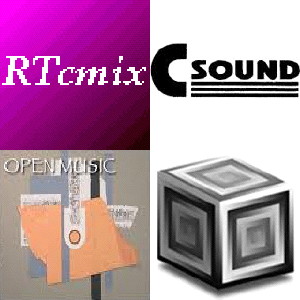Sound: Advanced Topics I


For years and years and years this class was titled "Computer Music I". We would then write in this syllabus something like this: Because the field of "computer music" is so broad as to be almost silly as a definite label, we decided awhile ago to make this seminar a topic-oriented seminar. But NO MORE! We've finally decided to be honest about what we do, and we now admit -- in the very title -- that this will be a 'topic-oriented' class.
So what is the 'topic' we will be orienting this semester? We will be building on four different bases. I have always been interested in analyzing how different tools that we use shape the way we think. This is particularly true in music, and particularly particularly true with configurable music technologies. What we plan to do is to cover four different music programming languages: RTcmix, CSOUND, OpenMusic and SuperCollder. Each one has various strengths and weaknesses, and our focus in this class will be on doing projects in order to see how they alter our creative imagination. We also plan to use this approach as an excuse to show some interesting work that has been done in each of these languages.
As a result, this class will be structured differently than it has in the past. Typically this course was aimed at producing a "final project" to be completed by the end of the term. We may still want to do this, but the bulk of the class work will be on doing smaller projects (one every 3 weeks or so) using the languages we present. We may be overly-optimistic in expecting you to learn and use in several weeks computer-music languages that are usually taught over the course of an entire semester, but hey -- you all are Smart and Motivated, right? Honestly, don't get worried about this. Even if you totally crash and burn trying to use these tools, that will be instuctive (yeah, a "learning experience", dat's da ticket!).
Several of these languages have a range of interfaces enabling their use. We'll attempt to show the most common/easiest ways of using them in class. We'll also be using Macintosh computers, but most have some Windows or Linux support (although the Windows version is sometimes outdated or poorly maintained). We have machines available for use with the software we cover in class in all of our studios, so you should be able to get your work done. Let us know if you are encountering problems! For several of the languages we present, we will be assuming a basic familiarity with Max/MSP. If you feel you don't have the requisite knowledge, get in touch with Chris or me and we'll set up some tutorial sessions with you.
Because several of these languages are not our own main music creation
tools, we'll have several special guest-stars who are language-adepts
coming into the class as the term progresses. Stay tuned for specific
info about them. They will be listed on the
course syllabus
as soon as things get set.
As well as the language links above, here are a few more links to software that might be useful to you for the class:
Please let us know if you are having problems getting equipment or
software apps to work for you. In general, if you are having difficulty
understanding the programming paradigms
we are using or the applications and information we are covering,
be sure to talk to us. We'll be happy to sit down and work through
any issues with you.
Each week we do will become a link to information relating to that class. We'll try to keep up with linking in class patches, examples and information, but we may fall behind. Yell at us when we do.
You might also find worthwhile information in some of the past
versions of this seminar (and our other CMC classes) we have
offered. If you go to the
CMC Course Listing
page and scroll down to the "Course Archives" section you will find
links to the on-line presence of our previous classes.
It's always a good idea to make an appointment to see me, even during my purported office hours, because I often have to run around campus like a maniac doing strange, computer-music stuff. If you need to contact someone at the CMC or Music Department using your actual voice, the relevant phone numbers are:
I say this every year, and generally people believe it (I think): by this point in your career the last thing you should be worrying about is a grade. The main thing is to find something that you'd really like to do and then do it. Please don't try to impress us with your consummate knowledge and skill, we are more impressed by people who do things. Honest!
Hope you enjoy the class!
